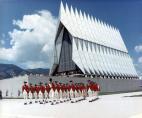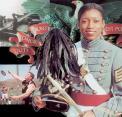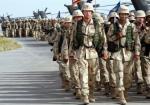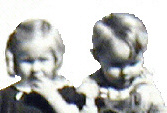
Evangelizing the Military
Just a pen stroke away!
The Air Force Academy continues to struggle with social forces. The most widely known diversion from the Academy’s mission are allegations and investigations of sexual discrimination. Although the Academy evidently hasn't got the problem completely under control, it finally appears on the verge of doing so.
Even more serious is what has come to light as a disturbing distraction that was about to become a very ugly and dangerous trend: religious intolerance. If this problem isn’t quashed decisively and rapidly, it will become a long-lasting, heavy yoke for the Academy to bear, with consequences for our military establishment that are frightening to contemplate. The Air Force just recently began taking steps to address this problem; it will be interesting to see how aggressively it moves to exorcise it at the Academy. Even more interesting would be a thorough internal review of how pervasive the problem is in the other academies and throughout the military community at large.
Putting the responsibility where it belongs: That these problems exist at all points out where the responsibility lies--squarely on the shoulders of Air Force leadership and the leaders it designates to run the Academy. What weaknesses (or strengths) that manifest themselves at any level of the closed military social order are the direct result of the failu
 re (or success) of leadership--starting at the top.
re (or success) of leadership--starting at the top.The easier of the two problems to deal with was the 1976 integration of females into the three service academies. It didn’t take rocket scientists to anticipate, plan for, and solve problems before the first female cadet arrived.
 Unfortunately, the planners viewed the problem as limited to logistics. That is, they failed to adequately anticipate the attitudes (or, in today’s lingo, “culture”) that would greet women when they first arrived. Thus, for almost 30 years, the cadet corps at the Air Force Academy was left to its own devices—to accept females as equals or not. When sexual harassment and abuse began to surface by the reporting of some gutsy female cadet-victims, the Air Force finally was induced by Congress to shake up
Unfortunately, the planners viewed the problem as limited to logistics. That is, they failed to adequately anticipate the attitudes (or, in today’s lingo, “culture”) that would greet women when they first arrived. Thus, for almost 30 years, the cadet corps at the Air Force Academy was left to its own devices—to accept females as equals or not. When sexual harassment and abuse began to surface by the reporting of some gutsy female cadet-victims, the Air Force finally was induced by Congress to shake up  things: By admitting there was an attitudinal problem, and then by finding leaders equipped with the appropriate attitudes and leadership skills to repair the damage done over three decades. Today, thankfully, signs finally point toward a healthy resolution of the sexual discrimination problem.
things: By admitting there was an attitudinal problem, and then by finding leaders equipped with the appropriate attitudes and leadership skills to repair the damage done over three decades. Today, thankfully, signs finally point toward a healthy resolution of the sexual discrimination problem.But when it comes to religion, the problem—not as predictable as the sexual discrimination problem—is much more subtle and insidious, as is the challenge to Air Force leadership skills. To begin with, the problem has a very emotionally charged background. For example, if you (or an Air Force officer charged with administering policy at the Academy) are one of the 80 percent or more Americans said to identify themselves as firm believers in God, then at first blush you’ll probably see nothing wrong with the service academies having a robust religious program. In fact, that’s the way it has always been in every service academy since they were founded. But the vital difference today is this: Religion has always been recognized as a highly personal and—here’s the key—a completely voluntary activity.
So what’s happening today? How can leadership be blamed for a problem that 80 percent of us would say isn’t a problem? Some analysts even assert it’s not the lack of leadershi
 p promoting and backing religious activities in the Academy, but too much of it and for the wrong reasons. I’d take it one step further by blaming the leadership that didn’t notice or purposely ignored “mission creep,”that is, the fact that the “religious right”—a euphemism for the evangelical sector of the broad American religious panorama--had gained tremendous influence in the U.S. Air Force through its Chaplain Service Corps. This phenomenon parallels the rapid growth of this sector during the past decade. Just as analysts noted that George W. Bush rode decisively into his second presidential term on an unanticipated surge of support from the “religious right,” so too is this force the same that has been busy asserting itself inside the military—down to the point of codifying its dogma in official Air Force doctrine.
p promoting and backing religious activities in the Academy, but too much of it and for the wrong reasons. I’d take it one step further by blaming the leadership that didn’t notice or purposely ignored “mission creep,”that is, the fact that the “religious right”—a euphemism for the evangelical sector of the broad American religious panorama--had gained tremendous influence in the U.S. Air Force through its Chaplain Service Corps. This phenomenon parallels the rapid growth of this sector during the past decade. Just as analysts noted that George W. Bush rode decisively into his second presidential term on an unanticipated surge of support from the “religious right,” so too is this force the same that has been busy asserting itself inside the military—down to the point of codifying its dogma in official Air Force doctrine.Concrete evidence of how deeply the “religious right” has penetrated the Academy was revealed in the recent Air Force announcement that it had withdrawn an ethics manual that allowed its chaplains to “instruct and/or evangelize” members of the military not affiliated with a particular religion. A recent Reuters article highlights these surprising “ethics guidelines” in connection with a law suit filed against the Air Force:
Air Force Academy cadets have complained that evangelical Christian leaders on campus used their positions to push their religion and one Jewish graduate, who has a son enrolled at the academy, filed suit in federal court last week to force the chaplains to stop proselytizing.
The Air Force said a Code of Ethics statement issued by the Air Force Chaplain Service in January stated: "I will not actively proselytize from other religious bodies. However, I retain the right to instruct and/or evangelize those who are not affiliated."[emphasis added]
The Air Force said these guidelines were "withdrawn for further review" on August 10.
"It was pulled to be reviewed following the release of the interim religious guidelines that were put out" on August 29, said Air Force spokeswoman Jennifer Stephens.
These guidelines warned against promoting any particular religion in official communications or meetings, athletic contests and ceremonies and cautioned against pushing "religion over non-religion."
A team from Yale Divinity School said in April it had found evangelical Christian proselytizing commonplace at the Air Force academy, in Colorado Springs and described a chaplain telling cadets they would "burn in the fires of hell" if they were not born-again Christians.
My take: This sort of activity has no place in a closed society such as the Academy or, for that matter, in the wider military services. Before the present heady days when the “religious right” came to enjoy its new found status in our society, the climate inside the military community was always strictly apolitical and non-invasive.
I can speak from my own military experience that goes back to 1951 as a young cadet in
 New Mexico Military Institute (NMMI) in Roswell, New Mexico--a respected, U.S. Army-accredited, commission-issuing institution akin to Virginia Military Institute and the Citadel. During my three years in that private institution, where it would have been very easy for proselytizing to become officially installed as part of “a wholesome curriculum,” never once did I feel pressure from the institution or from my fellow cadets to attend chapel services that were strictly voluntary. This attitude and policy were consistent with that of all the military academies since their founding and the military establishment in general.
New Mexico Military Institute (NMMI) in Roswell, New Mexico--a respected, U.S. Army-accredited, commission-issuing institution akin to Virginia Military Institute and the Citadel. During my three years in that private institution, where it would have been very easy for proselytizing to become officially installed as part of “a wholesome curriculum,” never once did I feel pressure from the institution or from my fellow cadets to attend chapel services that were strictly voluntary. This attitude and policy were consistent with that of all the military academies since their founding and the military establishment in general.How the system has always worked: In 1963 I was associated with a relevant incident while stationed in Berlin, Germany. A first lieutenant of the Latter Day Saints (Mormon) persuasion had instituted--at the beginning of their daily duty shifts--a mandatory “prayer service” for his 50-man duty contingent. The lieutenant’s senior non-commissioned officer reported this development to me in my capacity as the operations officer staff assistant. After observing the lieutenant’s next duty shift, I confirmed that indeed, he was supplicating the Lord to bless himself and the men under his control before they commenced their daily toil in the service of the American people.
Although the Air Force (or any other military service) had no policy at that time—written or otherwise—nevertheless, we were the descendants of a long, unwritten policy in which religion was strictly a voluntary activity on a serviceman’s off-duty time. On the strength of this tradition my boss, a young black major, didn’t hesitate to act decisively. He ordered the lieutenant to cease and desist, pointing out that government time was not his to covet for any personal or religious reason. He explained to the chagrined officer—who countered wi
 th the argument that, in order to avoid the major’s “on government time” logic, he would simply require his men to show up five minutes before their official duty time—that he would risk a court-martial for issuing an illegal order under the Uniformed Code of Military Justice (UCMJ). The lieutenant, a functionary in the local Mormon Church, made noises to the effect that his church might escalate the matter to the level of the Secretary of Defense, but his more prudent elders in the LDS hierarchy must surely have nixed that move as folly. Case closed.
th the argument that, in order to avoid the major’s “on government time” logic, he would simply require his men to show up five minutes before their official duty time—that he would risk a court-martial for issuing an illegal order under the Uniformed Code of Military Justice (UCMJ). The lieutenant, a functionary in the local Mormon Church, made noises to the effect that his church might escalate the matter to the level of the Secretary of Defense, but his more prudent elders in the LDS hierarchy must surely have nixed that move as folly. Case closed. This is where leadership at the Air Force Academy has been wanting. Someone, som
 ewhere along the line when religious dogma began to make its appearance in official “ethics guidelines”—as we now discover covered not only the Academy, but the entire Air Force structure—leaders failed to step up and invoke the simple, common-sense tradition articulated and enforced by my young black Air Force boss in 1963: Religion shall not charge the military (and the taxpayers who sustain it) time to proselytize.
ewhere along the line when religious dogma began to make its appearance in official “ethics guidelines”—as we now discover covered not only the Academy, but the entire Air Force structure—leaders failed to step up and invoke the simple, common-sense tradition articulated and enforced by my young black Air Force boss in 1963: Religion shall not charge the military (and the taxpayers who sustain it) time to proselytize.Religion is a very personal matter that must remain voluntary, especially within a closed, hierarchical military society, where it would be all too easy for its zealots to codify a religious particular dogma as an “inherent” part of that social organization. That’s exactly what the Air Force Chaplain Service “ethics guidelines” were intending to do. And what better place to put this code in place than the Air Force Academy—the heart of the Air Force’s
 source of its future leaders.
source of its future leaders.Had this development not been exposed, it was only a pen stroke away from finding a permanent place into one of the Air Force Manuals that dictate every phase of operational life of its service members (as opposed to the off-duty, personal life for which no manual does or should exist) .
In the interest of full disclosure, the author was an Air Force officer who taught German language at the Air Force Academy from 1970 to 1973. This should explain any apparent biases he may hold in favor of the Air Force Academy in this essay.

No comments:
Post a Comment